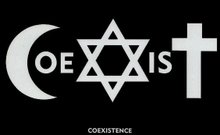 "It will greatly help you to understand scripture if you note – not only what is spoken and written, but of whom and to whom, with what words, at what time, where, to what intent, with what circumstances, considering what goes before and what follows."
"It will greatly help you to understand scripture if you note – not only what is spoken and written, but of whom and to whom, with what words, at what time, where, to what intent, with what circumstances, considering what goes before and what follows."
--Miles Coverdale
I would venture to say that there are as many interpretations of the bible as there are readers of the bible. Everyone who reads the bible, interprets it, no matter how "objectively" they approach it. I've never met anyone who holds the EXACT same understanding of the Bible. There are many schools of thought on how to interpret the bible: literally, figuratively, culturally, or historically, (i.e. flawed humans sincerely wrote down a testament to or of God's truth, but still were subject to err). Many readers combine a variety of methods to interpret biblical texts. Even the most staunch literalists admit to figurative aspects of scripture, such as Jesus' parables or instances when makes statements like: "...Drink my blood and eat my flesh..." Obviously Jesus in not literally telling us to drink blood and eat flesh, He's using a metaphor to symbolize the nature of salvation and the importance of His sacrifice.
Lately, I have been reading books written by scholars who hold different views of the bible and how it should be interpreted, from conservative evangelicals all the way to agnostic unbelievers. It's very important to me to challenge my beliefs by honestly listening to the views of others, not just automatically dismissing any notion that runs contrary to my beliefs and assumptions. The latest book I finished reading on the subject of bible interpretation is:
"How To Read The Bible: History, Prophecy, Literature--Why Modern Readers Need To know the Difference and What It Means For Faith Today," written by Steven L. McKenzie, a professor of Hebrew Bible at Rhodes College in Memphis, Tenn.
McKenzie explores the notion of genres in the bible. He claims that certain books within the bible are of different genres and therefore have different purposes, contexts, and methods to convey truth. Some are literal, others are figurative, some satirical, others poetic, some prophetic, and others historic. He also elaborates on the ancient concepts of prophecy, history and literature and how they differ from modern understanding. I learned greatly from this book, although I did not agree with many of its conclusions. But the most important thing to be gained from books like these is this: Literalists often accuse nonliteralists (or partly literalists) of not taking the bible seriously or randomly picking and choosing which parts to take literally or not. I am finding that many people who hold alternative views DO indeed take the bible seriously, more seriously than I have, if I am being honest. They take it SO seriously that they have learned the original languages fluently to read and compare the earliest manuscripts of the bible and have mastered the histories and cultures from which bible texts emerged to better understand the context, language, purpose, and style.
Now, that doesn't mean that every conclusion nonliteralists/partly-literalists arrive at is the end all be all, it just means that accusing them of haphazardly picking the parts of the bible that suits their tastes to be taken literally is just not the case. I was guilty of making that accusation as a teenager. Now, I realize there is a very in depth process of sifting through biblical text and uncovering their genre, intent, and meaning. Agree or disagree with the conclusions, but give credit where credit is due. McKenzie, in particular, holds the Bible in VERY HIGH REGARD and asserts that there is nothing wrong with the bible, but only people's understanding of it. The debate is not about IF the bible is truth, but which form truth takes in each book of the Bible. His analysis of the book of Jonah was absolutely astounding. I will forever read the book of Jonah with new eyes because of it.
Strengths: It's thought-provoking and challenging and will introduce you to the world of textual criticisms and biblical interpretation.
Weaknesses: McKenzie, like a true scholar, tends to be a bit tedious and repetitive in explaining textual jargon.
Read, if you dare. :)
"The Bible is a harp with a thousand strings. Play on one to the exclusion of its relationship to the others, and you will develop discord. Play on all of them, keeping them in their places in the divine scale, and you will hear heavenly music all the time."
--William P. White
 What makes the temptation of power so seemingly irresistible? Maybe it is that power offers an easy substitute for the hard task of love. It seems easier to be God than to love God, easier to control people than to love people, easier to own life than to love life. Jesus asks, "Do you love me?" We ask, "Can we sit at your right hand and your left hand in your Kingdom?" (Mt. 20:21). We have been tempted to replace love with power.--Henri Nouwen
What makes the temptation of power so seemingly irresistible? Maybe it is that power offers an easy substitute for the hard task of love. It seems easier to be God than to love God, easier to control people than to love people, easier to own life than to love life. Jesus asks, "Do you love me?" We ask, "Can we sit at your right hand and your left hand in your Kingdom?" (Mt. 20:21). We have been tempted to replace love with power.--Henri Nouwen




 Grady boldly explores the Genesis account, examining God's ideal creation, the miserable consequences of the Fall, and the miraculous, wondrous consequences of the cross: the restoration of both men and women to their original divine inheritance through Jesus' sacrifice. He examines the lives and implications of the female heroines of the bible: Deborah, Hulda, Miriam, Mary Magdelane, the many other Marys (hehe), Junia, Proverbs 31 woman, Priscilla, Philip's daughters, etc. He analytically and holistically examines Paul's writings, which seemingly appear to bar women from teaching/preaching/praying/leading in the presence of men, limit the spiritual gifts and capabilities of women, and advocate a heavily restricted-participatory status in the home, marriage, and society. Grady masterfully weaves together the the text, original historical and cultural contexts, the original language and the various interpretations among biblical scholars. He then shifts to a holistic approach to offset these isolated verses with the heart and message of the rest of the bible, believing scriptures should affirm each other and not stand in opposition to one another. He explores church history, challenging the basis for which some of these male-dominated interpretations emerged. The book has a personal feel to it, because Grady includes the stories of great Christian women leaders throughout church history and present day women who are restricted and conflicted. His scriptural study is EXTENSIVE, exploring stories and verses in Genesis, Numbers, Deuteronomy, Joshua, Job, Judges, Ester, Psalms, Proverbs, Joel, Jeremiah and large chunks of nearly every book in the New Testament.
Grady boldly explores the Genesis account, examining God's ideal creation, the miserable consequences of the Fall, and the miraculous, wondrous consequences of the cross: the restoration of both men and women to their original divine inheritance through Jesus' sacrifice. He examines the lives and implications of the female heroines of the bible: Deborah, Hulda, Miriam, Mary Magdelane, the many other Marys (hehe), Junia, Proverbs 31 woman, Priscilla, Philip's daughters, etc. He analytically and holistically examines Paul's writings, which seemingly appear to bar women from teaching/preaching/praying/leading in the presence of men, limit the spiritual gifts and capabilities of women, and advocate a heavily restricted-participatory status in the home, marriage, and society. Grady masterfully weaves together the the text, original historical and cultural contexts, the original language and the various interpretations among biblical scholars. He then shifts to a holistic approach to offset these isolated verses with the heart and message of the rest of the bible, believing scriptures should affirm each other and not stand in opposition to one another. He explores church history, challenging the basis for which some of these male-dominated interpretations emerged. The book has a personal feel to it, because Grady includes the stories of great Christian women leaders throughout church history and present day women who are restricted and conflicted. His scriptural study is EXTENSIVE, exploring stories and verses in Genesis, Numbers, Deuteronomy, Joshua, Job, Judges, Ester, Psalms, Proverbs, Joel, Jeremiah and large chunks of nearly every book in the New Testament.
























 "God's Politics: Why The Right Gets It Wrong and The Left Doesn't Get It"
"God's Politics: Why The Right Gets It Wrong and The Left Doesn't Get It"











